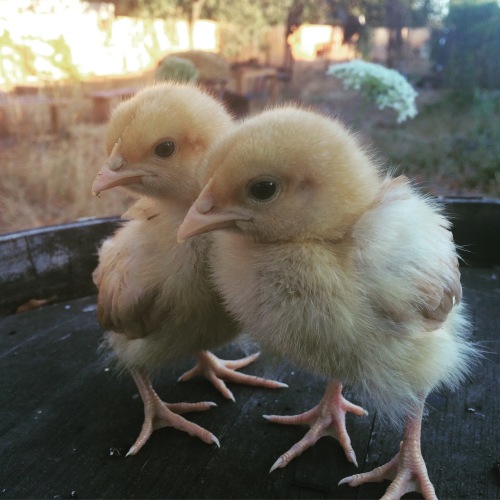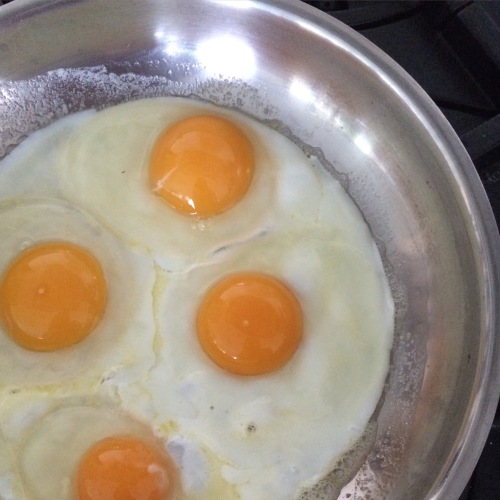It is officially chick season! The brooders at feed stores are filled with fuzzy meep-meeps, and if you follow anyone on instagram that’s remotely urban farming/farming/homesteading related, your feed is likely blowing up with pictures of incubating eggs and hatching chicks. 
Despite the cuteness, if you are thinking of getting chickens it is very important to know what you’re getting into. While I am not adding anyone new to my own urban flock, I have had an idea incubating for quite some time (get it? incubating? Man, I crack myself up). I thought I’d share a bit more about raising chickens by doing a series of detailing answering some of the questions I am frequently asked.
Which starts us off on the number one question, as soon as someone hears I have hens:
How many eggs do you get?
It totally depends. This is probably the answer for almost every garden/chicken/homesteading question ever asked.
There are many factors that determine your egg production: how many hens you have, the time of year, the type of bird, wether or not the bird is broody, the weather, health and stress, how old the hens are, and just general individuality. (Disclaimer: despite proofreading, I’m sure there is an effect/affect error in here somewhere. Just go with it). The number one factor that affects how many eggs I collect is based off how many hens I have. Currently, my flock contains 10 hens. I will never get more than 10 eggs a day. It takes 26 hours for an egg to develop in a hen, so you will basically get one almost every day, if nothing else is factored in. However, there many other things that should be considered. 
A hen will usually start laying at around 6 months. A good layer produces about 20 dozen eggs her first year. In the 2nd year, she will produce 16-18 dozen. And so on, with about a 20% reduction each year. A hen can live to up to 15 years old, but usually at around age 3 you’ll notice a significant egg reduction. Commercially, hens are kept until about 2 years. This is the factor that people need to think the most about when getting chicks. What will you do with them after they stop or decrease laying? Some people are fine to keep as pets, some will turn their birds into soup. Either is perfectly ok, but just think about it first.  Egg production is also affected by weather. Most lay best between 45-80 degrees. Any colder or hotter, you might see egg production drop. They also slow down or stop completely once daylight hours drop below 14 hours. I have found that younger layers seem to be less affected by daylight hours than older birds. You can extend the daylight by lighting the coop at night, but keep in mind you are disrupting the natural cycle and period of rest. Chickens need 6-8 hours of rest a day.
Egg production is also affected by weather. Most lay best between 45-80 degrees. Any colder or hotter, you might see egg production drop. They also slow down or stop completely once daylight hours drop below 14 hours. I have found that younger layers seem to be less affected by daylight hours than older birds. You can extend the daylight by lighting the coop at night, but keep in mind you are disrupting the natural cycle and period of rest. Chickens need 6-8 hours of rest a day.  Molting also affects egg production. Molting, or the process of growing new feathers, takes lots of energy and she usually won’t lay during this time. The first molt is around 18 months old, then happens yearly or so. Some birds molt fast, just a few weeks, some take 2-3 months. If a hen goes broody, or the desire to hatch eggs, she stops laying- sometimes for months. This is why you may hear or read about chicken keepers trying to “break” their hens from being broody. If you can discourage the hen, she abandons hopes of hatching, and resumes normal laying. If she does sit and hatch a clutch, production also stops until the chicks are adult enough to not need her, usually a few months. If a hen is sick, bullied, diseased or malnourished, her production will obviously also be affected. Good animal husbandry makes happy, healthy hens but it also makes for a higher egg production.
Molting also affects egg production. Molting, or the process of growing new feathers, takes lots of energy and she usually won’t lay during this time. The first molt is around 18 months old, then happens yearly or so. Some birds molt fast, just a few weeks, some take 2-3 months. If a hen goes broody, or the desire to hatch eggs, she stops laying- sometimes for months. This is why you may hear or read about chicken keepers trying to “break” their hens from being broody. If you can discourage the hen, she abandons hopes of hatching, and resumes normal laying. If she does sit and hatch a clutch, production also stops until the chicks are adult enough to not need her, usually a few months. If a hen is sick, bullied, diseased or malnourished, her production will obviously also be affected. Good animal husbandry makes happy, healthy hens but it also makes for a higher egg production.  Some breeds are known for being excellent layers, such as the commercial Leghorns, others known for being poor, such as the fancy feathered Polish. In my current flock, my best production comes from my easter-egger, my Maran-Australorp cross, one of my Leghorns, and my Delaware. However, I have one Leghorn who’s just mediocre, and in the past I had an easter-egger that only laid maybe 5 times a year.
Some breeds are known for being excellent layers, such as the commercial Leghorns, others known for being poor, such as the fancy feathered Polish. In my current flock, my best production comes from my easter-egger, my Maran-Australorp cross, one of my Leghorns, and my Delaware. However, I have one Leghorn who’s just mediocre, and in the past I had an easter-egger that only laid maybe 5 times a year.  In my flock, my birds are not pets. I keep chickens for eggs, bug control, weed control, leftovers disposal, and occasionally meat. I rotate though my birds by hatching new ones each year and culling out the older ones, usually around age 3. That way, I almost always have hens laying within their first year while the 2nd year group is molting, and the 3rd year is tapering off.
In my flock, my birds are not pets. I keep chickens for eggs, bug control, weed control, leftovers disposal, and occasionally meat. I rotate though my birds by hatching new ones each year and culling out the older ones, usually around age 3. That way, I almost always have hens laying within their first year while the 2nd year group is molting, and the 3rd year is tapering off.  In the dark winter months, I usually get at least an egg a day, usually 1-3. This is plenty to keep my family in eggs. The rest of the year, I get anywhere between 6-10. The average is 8. This keeps us in eggs, as well as extras to barter, gift, and sell.
In the dark winter months, I usually get at least an egg a day, usually 1-3. This is plenty to keep my family in eggs. The rest of the year, I get anywhere between 6-10. The average is 8. This keeps us in eggs, as well as extras to barter, gift, and sell.
 And now you know, all the things that contribute to egg production! Stay tuned for my next FAQ. Thinking about keeping chickens but have a question? Let me know! I’d be happy to answer it for you!
And now you know, all the things that contribute to egg production! Stay tuned for my next FAQ. Thinking about keeping chickens but have a question? Let me know! I’d be happy to answer it for you!



I’s love to keep chickens but this house is a council rent and we are not allowed.
Besides there are local by laws that affect things too. Noise mainly. Chickens are not quiet!
I get the banning of roosters, because they are loud as hell and annoying, but other than when my hens are doing their egg laying song, they are pretty quite. But people can find fault with anything. I think the 15 minutes of noise sure beats the constant barking of the dog 2 doors down!
Yeah… We have a lot of dogs around here.
The problem is that the rules are often set down by well meaning people with no knowledge.
Yeah… Chickens (And roosters) can be noisy… So can kids… Should we ban those too?
Logic, eh?
B-)
I’m ok with banning kids, as I’m childfree and not a huge fan. 😉 At least in certain situations (like fancy sit down dinners!)
I wish there were ordinances against dogs that always bark, or eat fences…our last neighborhood had an HOA that prevented chickens. This one has no HOA and I’m still working on convincing my husband. We eat 6-8 eggs a day, so it’d really help the budget (I think?) to not buy the organic grass eggs all the time…
There’s a question for you: how does the finances add up? Do you use feed in winters?
Great question! I’ll work on that 🙂
The chicks are so cute. My neighbour has chickens. I think they are truly beautiful birds and I love hearing their happy noises from across the fence.
Living in an apartment complex we couldn’t have chickens, but they are everywhere in Hawaii! Lots of people have them, but there are so many wild ones all around. I was always very curious about the eggs, so thank you for the info!